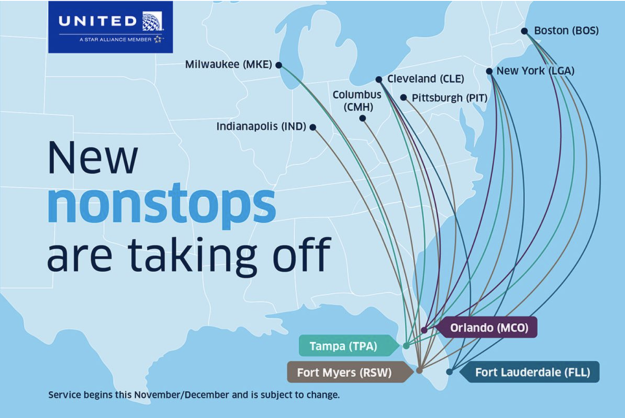United adds Florida flights outside hubs in bet on getaway trips
United Airlines Holdings Inc. will bypass its hubs to debut nonstop flights from seven cities to Florida in November, betting that the coronavirus pandemic won’t disrupt typical travel patterns for winter-weary northerners.

The carrier believes that shifts in demand wrought by Covid-19 require an “opportunistic” approach to grab leisure travel—a faint bright spot for an industry in which business and international traffic has virtually disappeared. U.S. air travel is about 75% below year-earlier levels.
The nonhub flights are part of United’s effort to experiment in business planning, especially while the industry grapples with plunging revenue.
“We try new things and see how that goes,” said Ankit Gupta, United’s vice president of domestic network planning.
Starting Nov. 6, United will fly nonstop to Fort Lauderdale, Fort Myers, Orlando and Tampa with as many as 28 new daily trips. The flights will originate in Boston; Cleveland; Columbus, Ohio; Indianapolis; Milwaukee; New York’s LaGuardia Airport and Pittsburgh. Normally, such travelers would fly through hubs in Chicago or at Newark Liberty International Airport in New Jersey.
The airline is taking a bit of a flier, though. The new service is the carrier’s biggest expansion outside its hubs, which provide efficiencies that so-called point-to-point flights lack, and assumes United can fill the planes profitably. Florida has been among the states hit hardest by surging coronavirus infections and deaths, which could quash typical seasonal migrations to the Sunshine State from the Midwest and Northeast.
“We obviously cannot predict the coronavirus impact,” Gupta said. “If there’s another surge, we’ll have to adjust our capacity plans and maybe pare down some of that capacity.”
The nonstop service is expected to run through Jan. 10, typically the end of the holiday season. The Chicago-based airline hasn’t decided whether to use such point-to-point service next summer, during what typically is the industry’s peak season.
Similar Stories

CPaT partners with Wizz Air, Europe’s leading ultra-low-cost airline, to enhance aviation training
View Article
Air Transat takes off to Tulum from Montreal and Quebec City
View Article
Air France KLM Martinair Cargo achieves record online sales and accelerates commercial transformation
View Article[Freightos Weekly Update] Frontloading continues to put pressure on transpacific rates
Transpacific ocean rates increased slightly last week and are about 15% higher than at the start of December as frontloading ahead of expected tariffs is keeping vessels full.
View Article
American Airlines becomes only carrier to fly nonstop between Washington, D.C., and San Antonio
View ArticleOpen Skies agreement with the Dominican Republic enters into force
The U.S.-Dominican Republic Air Transport Agreement entered into force on December 19. This bilateral agreement establishes a modern civil aviation relationship with the Dominican Republic consistent with U.S. Open Skies…
View ArticleGet the most up-to-date trending news!
SubscribeIndustry updates and weekly newsletter direct to your inbox!





